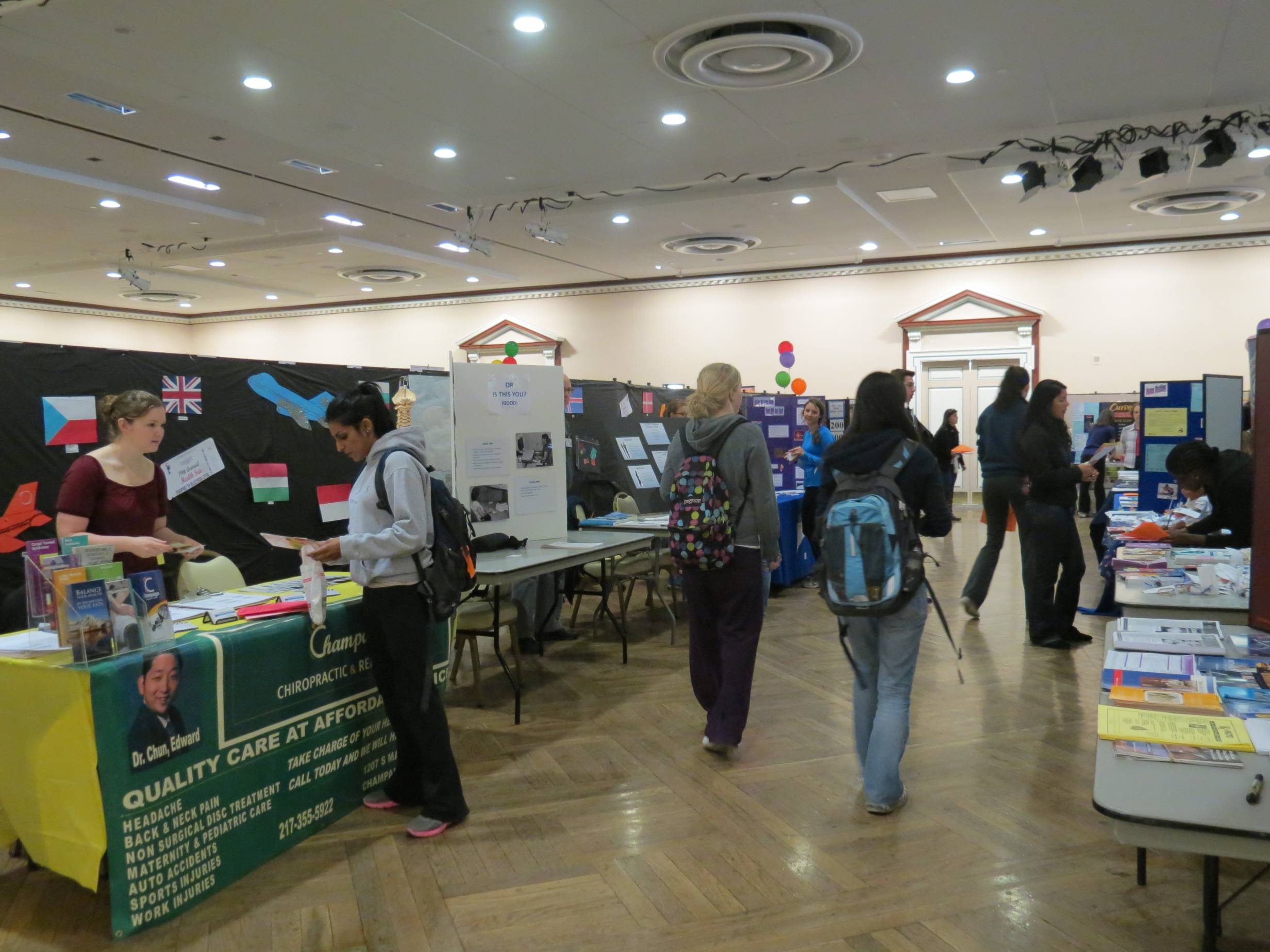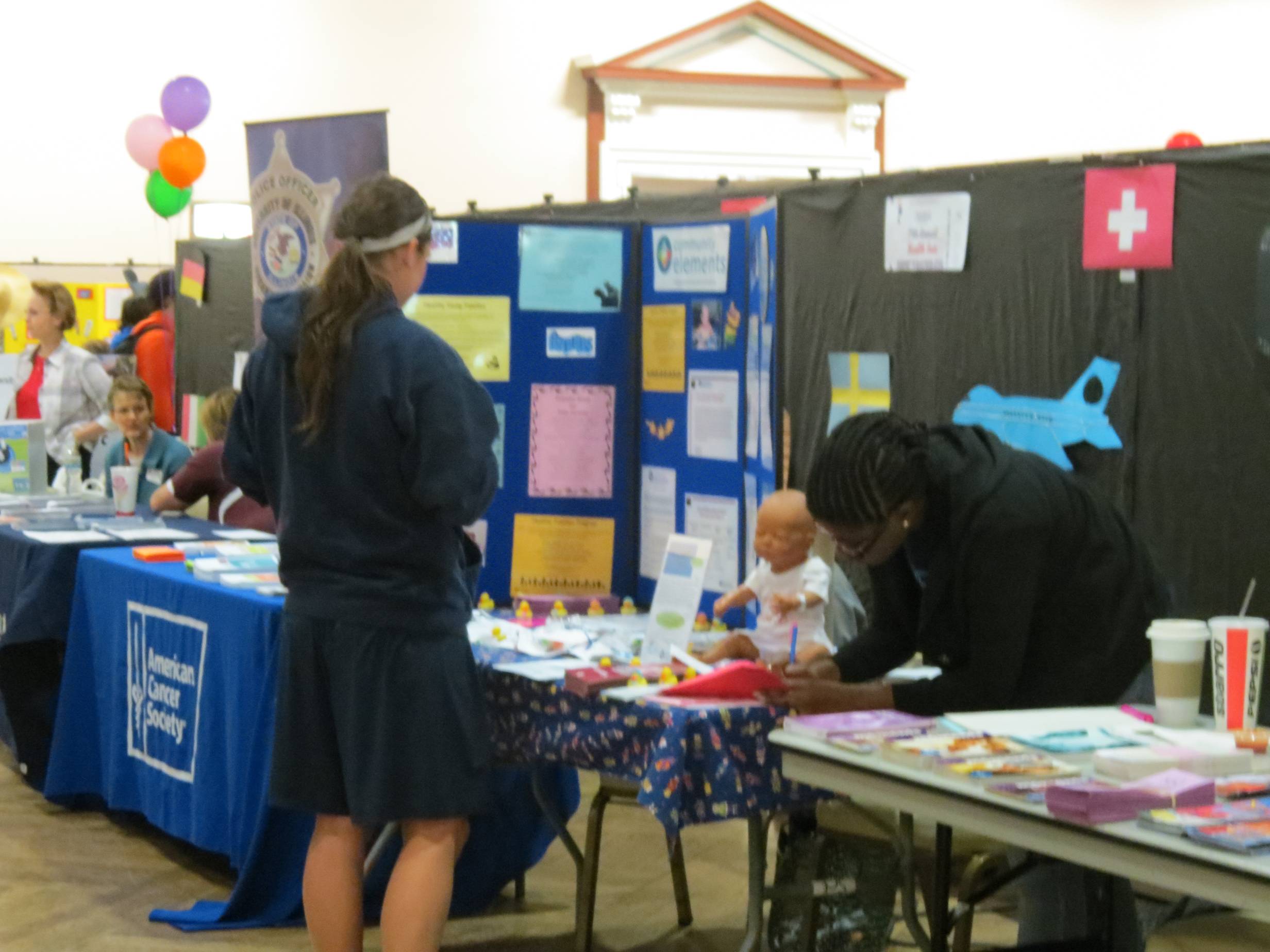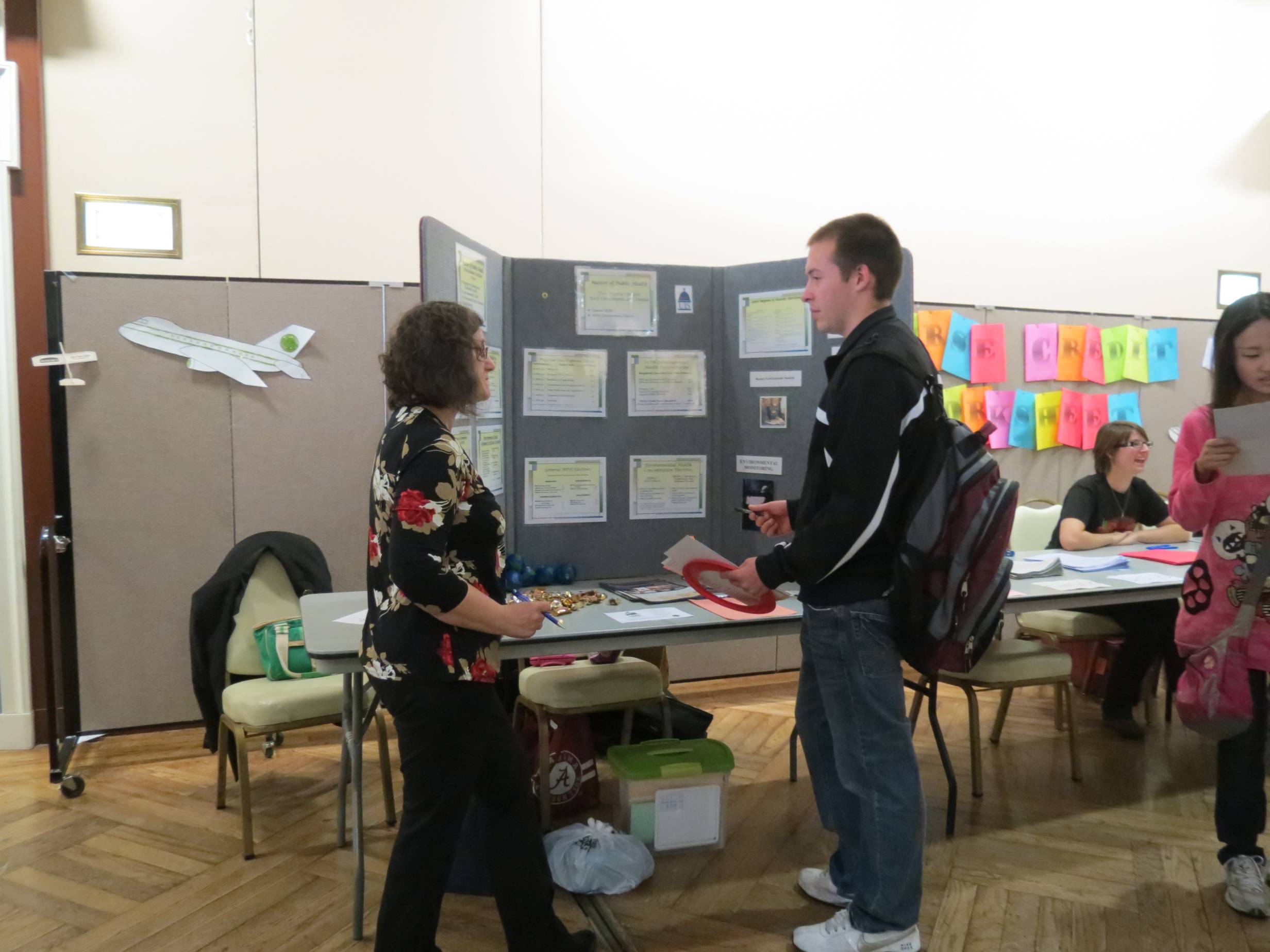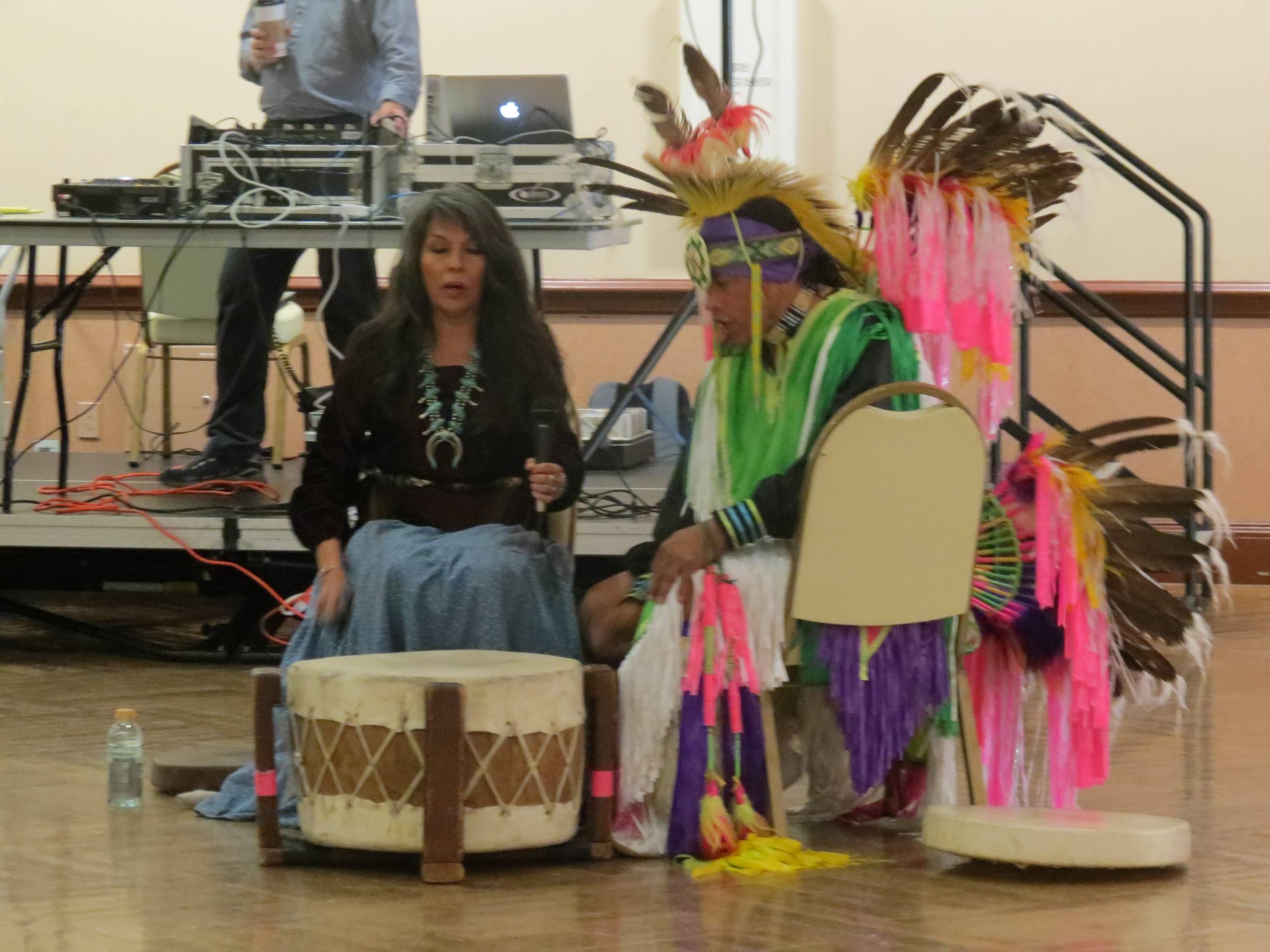Maribel Arteaga, U of I junior in molecular and cellular biology, had her blood pressure checked, her cholesterol tested, her body mass index read and her back massaged – all in one day and in the same place.
These were just some of the services offered Friday in the Illini Union during the 19th Annual McKinley Health Center’s Special Populations Student Health Concerns Committee Health Fair.
This year, 75 vendors were registered for the event, including various clinics and health centers around the Champaign-Urbana area, as well as vendors offering chiropractic services, massages and free manicures. In the past, 3,000-4,000 students have attended the event.
The health fair took place from 10 a.m. to 3 p.m. and was sponsored by the Special Populations Student Health Concerns Committee, a registered student organization interested in assisting the diverse population of campus in taking care of its health. The group holds programs for different groups of people on campus and reaches out to local schools by teaching programs such as alcohol awareness, sexual health and stress management.
Kayla Robertson, staff member of the Student Populations Student Health Concerns Committee, thinks college years are the most important time for students to develop an awareness of their health.
“When you have your parents kind of overseeing what you eat every day, hopefully you eat a little bit better,” Robertson said. “But when all of a sudden you’re living on your own, you have to cook for yourself, decide what to eat in the dorms, decide what to eat when you go out. That’s when habits are really developed. You decide if you’re going to work out. So really, if you’re not taking care of your health, you’re setting yourself up for failure later. It’s hard to break those habits once they’re established, and if we can get students to take care of themselves now, it’s much likely that later on down the road they’re going to continue those habits
 Shundra Parker works with Community Elements in Champaign in the Healthy Families Program. Parker took part in the health fair to discuss child development and spread information on topics such as choking hazards, child nutrition, shaken baby syndrome, and family time and communication.
Shundra Parker works with Community Elements in Champaign in the Healthy Families Program. Parker took part in the health fair to discuss child development and spread information on topics such as choking hazards, child nutrition, shaken baby syndrome, and family time and communication.
“Resources are important,” Parker said. “People need help, and they don’t know where to go, so hopefully we can get in contact with someone here who will know about us and can pass our information onto someone else, and we can help them as well.”
Parker said the fair can also inspires students to choose careers in health-related fields. After finding out about the services Community Elements offered, some students were interested in volunteering with the organization.
Dorene Campbell from the University of Illinois at Springfield participated in the fair  specifically to talk to students about future health careers. This was her first year participating in the fair to promote the university’s master’s program in public health.
specifically to talk to students about future health careers. This was her first year participating in the fair to promote the university’s master’s program in public health.
“I think it gives them a good feeling for what’s out there, what kind of careers are in public health or the health-related fields because it’s pretty diverse,” Campbell said.
The health fair is not only beneficial for students but is also a good opportunity for the vendors to make connections with the community.
“I think it’s an opportunity for vendors to interact with students and find out what their interests are and how we might better tailor our programs to meet their needs,” Campbell said.
Dr. Krista Jones gets a different kind of personal benefit from participating in the health fair. She works with the Urbana regional program of the University of Illinois at Chicago’s College of Nursing, and her booth offered blood pressure checks and information on healthy eating options on campus.
“It’s very gratifying to be able to interact with this tremendous student population and to be able to help educate them about their health and not only about their health but their family’s health and the health of the community so that … rather than being reactionary, they can go out there and be proactive, not only for themselves but for individuals in their family and individuals in the community, and really improve the overall health status of our population here in the Champaign-Urbana area.”
The Special Populations Student Health Concerns Committee provided entertainment for the event, including the Latin dance group Dance2XS Caliente, the dance team House Arrest 2, belly dancers and various other performers.
Larry Lockwood and Regina Psosie were two such entertainers, performing traditional Native American dance for students.
 Lockwood, from a northern Cheyenne tribe located in Montana, and Psosie, member of the Navajo Nation, perform social dancing. Psosie performs a style of dance called women’s traditional, while Lockwood performs the men’s fancy dance in his full regalia consisting of colorful Eagle feather bustles and bells.
Lockwood, from a northern Cheyenne tribe located in Montana, and Psosie, member of the Navajo Nation, perform social dancing. Psosie performs a style of dance called women’s traditional, while Lockwood performs the men’s fancy dance in his full regalia consisting of colorful Eagle feather bustles and bells.
“I believe that all of our social dances and songs actually contribute to a healthier lifestyle because as a full-blooded Native American, I recognize, not just in Indian country, but in my own family, that diabetes is an epidemic,” Lockwood said. “I’m 50 years old, and I’m one of the few people in my family that doesn’t have diabetes, and it’s because I’m still dancing. I really believe that, and it’s helping me keep strong. It’s helping me stay healthy, and that’s really the spirit that we want to share today. There’s more to healing I believe than the physical part … some of the stories that we’re going to share today talk a lot about the kind of healing that we have when we’re looking at ourselves and accepting ourselves as we truly are.”
The health fair couldn’t take place at a more perfect time for some students looking for stress relief as finals approach. Jay Singh, U of I sophomore in molecular and cellular biology, came to the fair for a massage service being offered.
“I think college students primarily are very stressed out,” Singh said. “I think that’s a given, and I think part of that deal is kind of sacrificing your health − mental, physical, any sort of way − and I think it’s part of the school’s responsibility, in some sort of fashion, to remind students of the resources that are available here, so a fair like this is really helpful in addressing those issues.”








